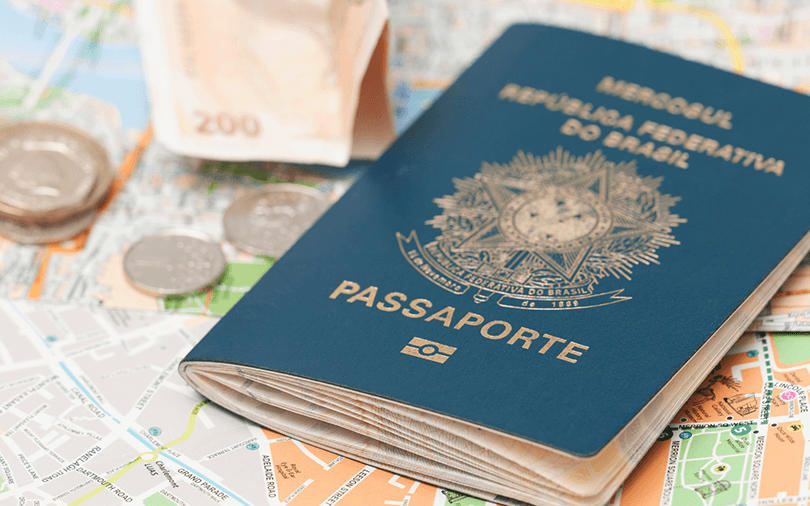Bom dia! Today you will learn how to say where you from from and where is your city. You will see the name of several countries and cities in Portuguese language. We will keep learning the numbers (21-100) and the necessary grammar. This is the second lesson of our extensive course (module 1, level A1).
Países (= countries)
First of all, we will learn the countries and figured out that they have gender and number.
– Masculine singular:
o Brasil, o Japão, o México
– Feminine singular:
a Alemanha, a China, a Grécia, a Índia, a Polónia, a Rússia, a Suécia, a Ucrânia.
(a) Espanha, (a) França, (a) Itália, (a) Inglaterra.
– Masculine plural:
os Estados Unidos
– Feminine plural:
as Filipinas
– Neutral:
Portugal, Angola, Moçambique, Marrocos, Cuba e Israel.
Consequently, when we talk about countries, we use 4 types of defined articles:
| Artigo definido | |
|---|---|
| Singular | |
| Masculino | Feminino |
| O | A |
| Plural | |
| Masculino | Feminino |
| OS | AS |
For the most of the countries the article is mandatory. Although, “neutral” countries have no article. For “Espanha”, “França”, “Itália” and “Inglaterra”, the articles are optional: if you want you use, if not, you don’t. That’s why you can say “a França” or just “França”. However, the simplest forms are more common.
Where are you from
Now you are able to answer to the question “De onde és?” (informal) or “De onde é?” (formal). It means “Where are you from?” in Portuguese language. For exemple, you can answer:
Sou de Portugal.
Sou do Brasil.
Sou da Rússia.
Sou dos Estados Unidos.
Sou das Filipinas.
Here “de” means “from” and it contracts with articles as follows:
De + o Brasil = do Brasil
De + a Rússia = da Rússia
De + os Estados Unidos = dos Estados Unidos
De + as Filipinas = das Filipinas
Consequently, we just say “de Portugal” because “Portugal” has no article.
Plural
After, we started talking about more than one person. As a result, we learnt the plural forms of pronouns.
| Singular (1 person) | Plural (+ 1 person) |
|---|---|
| Eu | Nós |
| Tu | Vocês |
| Você | |
| O senhor | Os senhores |
| A senhora | As senhoras |
| Ele | Eles |
| Ela | Elas |
Remember that “Nós” means “we” and “vocês” means “you” but for more than you person. For example:
De onde são? (= Where are you from?)
Somos da Bélgica. (= We are from Belgium.)
So, now we are also able to conjugate the plural forms of the verb “ser” (= to be), namely the full verb in the present (Presente do Indicativo):
| Verbo “ser” | |
|---|---|
| Eu | sou |
| Tu | és |
| Ele, ela, você, o senhor, a senhora | é |
| Nós | somos |
| Eles, elas, vocês, os senhores, as senhoras | são |
Cidades (= cities)
In addition, you can be more specific. Instead of “I am from Germany” you can say “I am from Berlin”, and you will use the same form. Here are some examples:
Sou de Berlim.
És de Paris.
Ele é de Lisboa.
Somos do Porto.
Elas são de Boston.
As you see, most of the cities have no article. That’s why we only say “de”. Although, there are exceptions as “Porto”. Therefore, we say “Somos do Porto”.
Where is it
For example, if someone says “Sou de Gdynia”, you can ask:
Onde é Gdynia? (= Where is Gdynia?).
The answer is:
Gdynia é na Polónia.
You can also ask:
Onde fica Gdynia? (= Where is located Gdynia?)
And the answer can also be:
Gdynia fica na Polónia. (= Gdynia is located in Poland.)
In order to express permanent location, we can use both verbs “ser” or “ficar”. Let’s see other examples.
Lisboa fica em Portugal.
Tóquio fica no Japão.
Moscovo fica na Rússia.
Chicago fica nos Estados Unidos.
Manila fica nas Filipinas.
Now we have the preposition “em”, which in this context means “in”. This preposition also contracts with articles to form one word.
Em + o Japão = No Japão
Em + a Rússia = Na Rússia
Em + os Estados Unidos = Nos Estados Unidos
Em + as Filipinas = Nas Filipinas
Diálogos (= dialogues)
Diálogo 1 (Dialogue 1):
– Eu sou de Lisboa. Vocês também são de Lisboa? (I’m from Lisbon. Are you from Lisbon too?)
– Não, nós não somos de Lisboa. Somos do Porto. (No, we are not from Lisbon. We are from Porto.)
E tu, Sasha, de onde és? (And you, Sasha, where are you from?)
– Eu sou da Rússia, de São Petersburgo. (I am from Russia, from St. Petersburg.)
Diálogo 2 (Dialogue 2):
– De onde vocês são? (Where are you from?)
– Somos de Krasnodar. (We are from Krasnodar.)
– Onde é Krasnodar? (Where is Krasnodar?)
– Krasnodar é na Rússia. E vocês, de onde são? (Krasnodar is in Russia. And you, where are you from?)
– Somos de Valência. (We are from Valencia.)
– Valência é em Espanha? (Is Valencia in Spain?)
– Sim, é! (Yes, it is!)
These dialogues are in the following video:
Números 21-100 (= Numbers 21-100)
Finally, we kept learning the numbers.
21 vinte e um
30 trinta
40 quarenta
50 cinquenta
60 sessenta
70 setenta
80 oitenta
90 noventa
100 cem
Conclusion
Did you miss our previous post about (lesson 1)? If yes, then click in “Introduce yourself in European Portuguese”, and learn how to do it.
Do you want to learn more and put your all the knowledge in practice? Do you want to speak Portuguese with Portuguese people? It’s simple: join us!
Remember, we are in Caldas da Rainha (Leiria region) and Matosinhos (Porto’s region), and also online!
See you soon.

